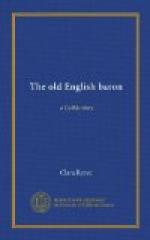“I thank you for these marks of your esteem and confidence,” said Edmund; “be assured that I will not abuse them; nor do I desire to pry into secrets not proper to be revealed. I entirely approve your discretion, and acquiesce in your conclusion, that Providence will in its own time vindicate its ways to man; if it were not for that trust, my situation would be insupportable. I strive earnestly to deserve the esteem and favour of good men; I endeavour to regulate my conduct so as to avoid giving offence to any man; but I see, with infinite pain, that it is impossible for me to gain these points.”
“I see it too, with great concern,” said Oswald; “and every thing that I can say and do in your favour is misconstrued; and, by seeking to do you service, I lose my own influence. But I will never give my sanction to acts of injustice, nor join to oppress innocence. My dear child, put your trust in God: He who brought light out of darkness, can bring good out of evil.”
“I hope and trust so,” said Edmund; “but, father, if my enemies should prevail — if my lord should believe their stories against me, and I should be put out of the house with disgrace, what will become of me? I have nothing but my character to depend upon; if I lose that, I lose every thing; and I see they seek no less than my ruin.”
“Trust in my lord’s honour and justice,” replied Oswald; “he knows your virtue, and he is not ignorant of their ill-will towards you.”
“I know my lord’s justice too well to doubt it,” said Edmund; “but would it not be better to rid him of this trouble, and his family of an incumbrance? I would gladly do something for myself, but cannot without my lord’s recommendation; and, such is my situation, that I fear the asking for a dismission would be accounted base ingratitude; beside, when I think of leaving this house, my heart saddens at the thought, and tells me I cannot be happy out of it; yet I think I could return to a peasant’s life with cheerfulness, rather than live in a palace under disdain and contempt.”
“Have patience a little longer, my son,” said Oswald; “I will think of some way to serve you, and to represent your grievances to my lord, without offence to either — perhaps the causes may be removed. Continue to observe the same irreproachable conduct; and be assured that Heaven will defend your innocence, and defeat the unjust designs of your enemies. Let us now return home.”
About a week after this conference, Edmund walked out in the fields ruminating on the disagreeable circumstances of his situation. Insensible of the time, he had been out several hours without perceiving how the day wore away, when he heard himself called by name several times; looking backward, he saw his friend Mr. William, and hallooed to him. He came running towards him; and, leaping over the style, stood still a while to recover his breath.
“What is the matter, sir?” said Edmund; “your looks bespeak some tidings of importance.”




